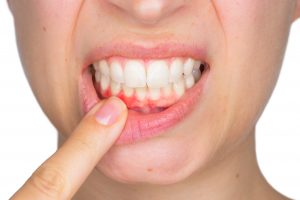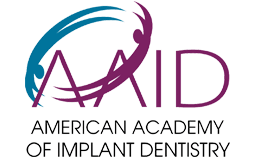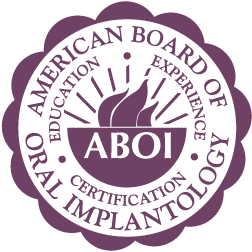Fight Gum Disease at Family Implant & Reconstructive Dentistry
Our experienced team of dental professionals in Havre de Grace, MD is dedicated to helping patients achieve healthy gums and maintain optimal dental health. Gum disease is a common condition that can lead to serious oral health problems if left untreated.
From non-surgical treatments to periodontal surgery, our Havre de Grace, MD dentist customizes our approach to each patient’s unique needs and goals. We’re committed to providing exceptional care and helping patients achieve a healthy, confident smile no matter what oral problems they may be facing. Call (410) 939-5800 today.
 What Is Gum Disease?
What Is Gum Disease?
Gum disease, or periodontal disease, affects the gums and surrounding tissues of the teeth. It’s caused by bacterial buildup and plaque on the teeth, which can lead to inflammation, swelling, and infection. If left untreated, gum disease can cause damage to the teeth and gums, leading to tooth loss and other health complications.
Stages of Gum Disease
Gum disease is typically divided into three stages:
- Gingivitis: The earliest stage, characterized by inflammation and swelling of the gums.
- Periodontitis: The second stage, where inflammation and infection spread to surrounding tissues and bone. Early periodontitis can be diagnosed by your dentist.
- Advanced Periodontitis: The most severe stage, characterized by severe bone loss, tooth loss, and gum recession.
Symptoms of Gum Disease
 Some symptoms of untreated periodontal disease may include:
Some symptoms of untreated periodontal disease may include:
- Bleeding gums
- Red, tender, swollen gums
- Gums that have pulled away from your teeth
- Persistent bad breath or a bad taste in the mouth
- Pus between your teeth and gums
- Separating or loose teeth
- Any change in the way your teeth fit together when you bite
- Any change in the fit of partial dentures
Periodontal Disease Treatment Options
There are various periodontal disease treatment options available. Those may include:
- Professional Dental Cleanings: Professional dental cleanings are a simple and effective way to remove plaque buildup and bacteria from the teeth and gums. During professional teeth cleanings, a dental hygienist will use specialized tools to remove buildup from the teeth and gums, leaving them clean and healthy.
- Scaling and Root Planing: Scaling and root planing is a deep cleaning procedure that removes plaque and bacteria from below the gum line. This procedure is typically used to treat periodontitis and can help prevent further damage to the teeth and gums.
- Laser Periodontal Therapy: Laser periodontal therapy like LANAP is a minimally invasive treatment option for periodontal disease that utilizes laser technology to remove infected tissue and promote healing. This treatment can be an effective alternative to traditional gum surgery, with less pain, swelling, and downtime.
- Bone and Gum Grafting: Bone and gum grafting restores lost bone and gum tissue due to advanced gum disease or tooth loss. During the procedure, grafts of bone or tissue are taken from other areas of the mouth or a donor source and transplanted to the affected area to promote new tissue growth.

- Antibiotics: Antibiotics can help kill the bacteria that cause gum disease and reduce inflammation and infection.
- Surgery: In some cases, surgery may be necessary to treat advanced gum disease. Surgery options may include gum grafting, bone grafting, or tooth extraction
Financing the Cost of Gum Disease Treatment
When it comes to treating gum disease, costs can range between $1,700 to $8,000, depending on the stage of the disease. The more severe the gum disease, the more expensive treatment is likely to become.
We understand that dental care can be expensive, and we want to make sure that cost doesn’t prevent you from getting the treatment you need. That’s why we offer a variety of financing options to help you afford your gum disease treatment.
- Check with your insurance provider: Many dental insurance plans cover a portion of gum disease treatment. We can help you file your claim and maximize your benefits.
- We accept most major insurance plans: Please bring your insurance card to your appointment.
- CareCredit: CareCredit is a healthcare credit card that offers flexible financing options. You can apply for a CareCredit card online or in our office.
- In-house payment plans: We offer in-house payment plans that can help you spread out the cost of your treatment.
If you have questions about financing options or would like to schedule a consultation, please call us at (410) 939-5800. Our friendly staff is happy to help.
Frequently Asked Questions
How do I know if I have periodontal disease?
Is gum disease contagious?
Can gum disease cause other health problems?
Let Us Help You Treat Gum Disease in Havre de Grace, MD
If you’re experiencing symptoms or warning signs of gum disease or have concerns about your dental health, don’t hesitate to schedule an appointment with our Havre de Grace, MD dentists. Our team of dental professionals is here to provide you with the care and support you need to maintain healthy teeth and gums.
To schedule an appointment, contact us today at (410) 939-5800. We look forward to helping you achieve a healthy, beautiful smile free of poor oral hygiene and periodontal diseases!




